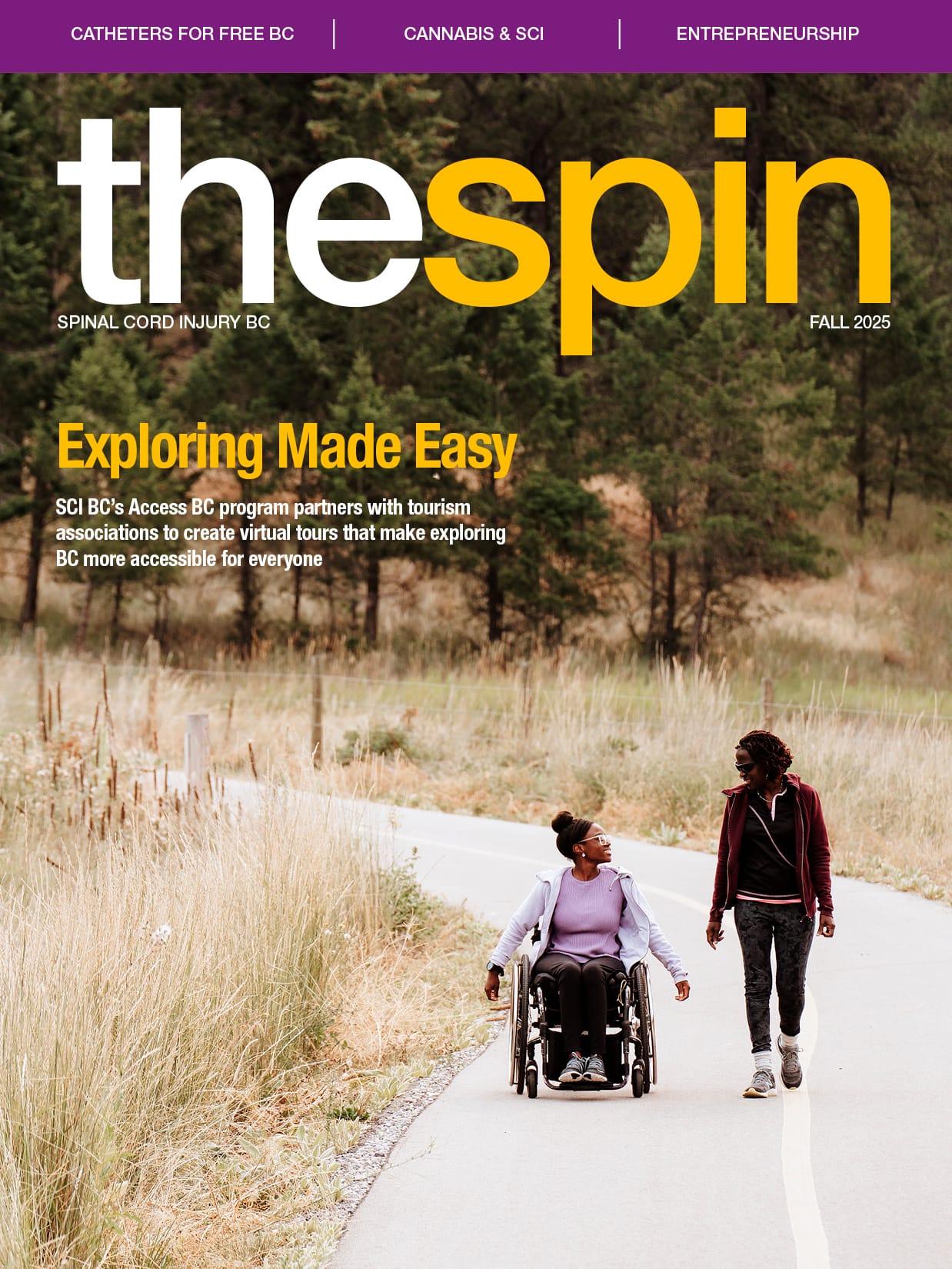
When Andy Caswell pictured retirement, he imagined slowing down, travelling a little, and spending more time with his family. Instead, he found himself paying thousands of dollars every year—just to pee. Definitely not the kind of “golden years” he had in mind.
Four years ago, Caswell was camping with his family outside Merritt. One day he was paddleboarding on the lake, the next he was undergoing emergency back surgery at Royal Inland Hospital in Kamloops. For years, doctors had chalked his pain up to aging. But scans told a different story: spinal stenosis in his lumbar spine, a narrowing of the spinal canal that damages spinal nerves. In the midst of the Covid-19 pandemic restrictions on hospital visitors and the stress of wildfires surrounding Kamloops, Caswell attributes the kind care he received and phone calls from friends and family from preventing his mental health from tumbling down a dark hole (his cellphone bill was $600 that month!)
He was then transferred to Lions Gate Hospital in North Vancouver, where he continued intensive outpatient physiotherapy after three weeks at GF Strong.
Caswell eventually reached the point where he could walk without a mobility aid. “I don’t walk well, but I can,” he says. “I’m quite fortunate for the mobility I did get back.”

But that wasn’t the end. The injury to the nerves just below his spinal cord (cauda equina syndrome) left Caswell with a neurogenic bladder. Like 90% of people with an SCI, his brain can’t tell his bladder when to empty. The only solution: catheters.
At first, short- and long-term disability coverage through his workplace meant 80% of his catheter costs were covered. But once he retired, the bills landed squarely on him. “I remember seeing my first bill going, Oh my god,” Caswell recalls. That bill, and the reality it represented, would eventually push him to launch Catheters For Free BC, an advocacy group urging the BC government to fund catheters for everyone who needs them.
Caswell’s story is far from unique. In BC, an estimated 26,000 people require catheters, whether due to spinal cord injury, spina bifida, multiple sclerosis, prostate cancer or other conditions that can cause neurogenic bladder. Experts recommend intermittent catheterization with 6–8 single-use, hydrophilic (lubricated/coated) catheters per day, to protect bladder and kidney health.
However, with catheters costing $2–$15 each, few can afford the recommended amount without coverage. Cheaper, uncoated options exist, but they take four times as long to insert and increase the risk of complications. Caswell himself spends up to $4,000 a year (a cost he compares to a yearly vacation), while others face bills of over $10,000. He says, “This isn’t a choice or a convenience. It’s a matter of survival.”
So, what happens when you can’t afford catheters? You’re forced to reuse them.
Even when cleaned, used catheters carry bacteria, raising the risk of urinary tract infections (UTIs), bladder damage, and kidney problems. It’s a costly and dangerous cycle: treating UTIs often requires antibiotics, ER visits, or hospital stays —expenses that end up costing the healthcare system than simply providing catheters in the first place. According to the Canadian Institute for Health Information, the average cost of treating a UTI in BC is over $6,000, renal failure more than $10,000, and kidney stones over $12,000. Research has shown that single-use hydrophilic catheters significantly reduce infection risks, yet many people are forced to reuse their catheters, use fewer than recommended, or settle for cheaper options that don’t work as well for their bodies.
Caswell also stresses the mental health impact. The financial strain, anxiety about running out, embarrassment over accidents, and isolation of avoiding social outings all chip away at quality of life. He hopes funding catheters will help reduce the high rates of anxiety and depression among people with SCI.
“The injury itself is mentally difficult on its own. Let alone having to worry about all these new added costs that have now become part of your reality,” he says. “Early on, I felt trapped. I didn’t know how I’d go anywhere with bulky catheter supplies. It felt like I’d have to leave events early or stay home entirely. Eventually, I discovered discreet products, but they’re expensive. Having access to them gave me freedom.”
One evening, while venting to his wife about the so-called ‘Fee to Pee’, she said plainly, “Well, instead of complaining about it to me, why don’t you do something about it?” That conversation became the spark for Catheters For Free BC.
“Our purpose as an advocacy group is to ensure that every British Columbian can pee for free. We’re calling on the BC government to recognize what the Canadian Urological Association, the Urology Nurses of Canada, Canadian Nurse Continence Advisors, and Nurses Specialized in Wound, Ostomy and Continence Canada all agree on: that single-use hydrophilic catheters are the gold standard of care,” says Caswell, “Our goal is to legislate financial support in BC, so these essential medical devices are publicly funded for everyone.”

Last year, Caswell hosted online peer discussions on catheters through SCI BC (we’ve covered issue in past issue of The Spin: see Better Bladder Care, Fall 2024 and Fee To Pee, Summer 2022). Out of the conversations grew a small group of peers who understood the stakes firsthand. Together they shared ideas, secured seed funding, and launched the Catheters For Free BC Foundation as a registered non-profit in April 2025. Their website (CathetersForFreeBC.ca) followed in May.
BC isn’t the only place where people with disabilities are demanding change. SCI Ontario worked with over 100 people with SCI and a group of committed stakeholders to produce a policy report “A Path to Modernize Public Coverage in Ontario for Intermittent Catheters and Related Supplies”. Their nine recommendations urge the Ontario government to reduce overlap across programs, adopt best practices from other provinces, prevent reuse of single-use catheters, ensure access to specialist nurses, improve Indigenous transitions from hospital to community, and better support seasonal workers.
The challenges are national. In the Winter 2022 issue of The Spin, our article “Raw Deal” covered findings from another report “Identifying Jurisdictional Gaps in Providing Essential Attendant Services, Medical Supplies, and Assistive Devices Needed by Canadians Living with Spinal Cord Injury”. Led by Dr Kristine Cowley from the University of Manitoba (with SCI Ontario’s Peter Athanasopoulos as co-author), the report confirmed what many already knew: catheter access is unequal and inconsistent across Canada.
Currently, Saskatchewan is the only province in Canada where intermittent catheters are funded, though coverage is capped at four per day (well below the recommended six to eight). Meanwhile, BC and Newfoundland are the only two provinces that means-test for mobility devices, attendant care, and bladder and bowel supplies, forcing people to “prove” financial need. As Caswell and others argue, essential medical supplies shouldn’t depend on your postal code.
For Caswell, funding catheters is cheaper, safer, smarter, and more equitable. Compared to coverage in many European countries, he says, “Canada as a whole is an outlier.”
He also knows the power of peers. At his very first SCI BC Peer Meetup, he remembers catheters being the “number one thing” he wanted to talk about. “It was one of those things that I felt talking to peers that are living it was better than trying to look up information. To hear from people, I know exactly what you’re going through and this is what works for me. That was a really big thing for me.”
Now, Caswell is turning to peers again for support. You can add your name to the petition at www.CathetersForFreebc.ca, and encourage others to sign as well. The group is active on Facebook, Instagram, and LinkedIn, making it easy to follow and share posts with your network. More importantly, Caswell hopes those affected will share their stories. He says, “It makes the issue real and helps the able-bodied public understand what people with disabilities are going through. Many people don’t realize most of us with SCI can’t urinate on our own. That realization could generate a lot of support.” You can submit your story to stories@cathetersforfreebc.ca (and let Caswell know if you’d prefer to remain anonymous).
Petitions and stories are just the beginning. Caswell welcomes volunteers to join the foundation’s executive committee to help draft letters, review strategy, and attend planning meetings. For those who can’t commit long-term, he invites peers to join him in meeting with local MLAs this fall and winter. Your presence as a local constituent can help show your MLA that the Fee to Pee is an issue in their community. These meetings are the next step after Caswell submitted a formal report to the Minister of Health in September.
Whether it’s the human toll of not funding catheters or the financial strain on the healthcare system, Caswell hopes policymakers will get on board.
Going #1 shouldn’t cost a fortune. Let’s flush the Fee to Pee in BC!
Read more stories from the Fall 2025 issue of The Spin, including:
- Virtual tours
- Entrepreneurship
- Cannabis
And more!




